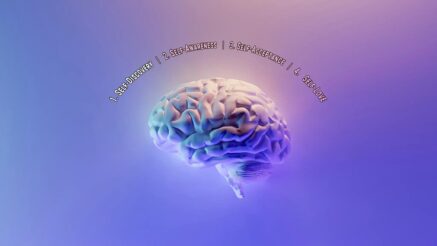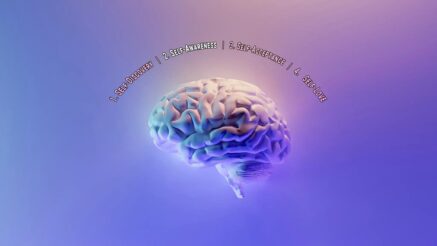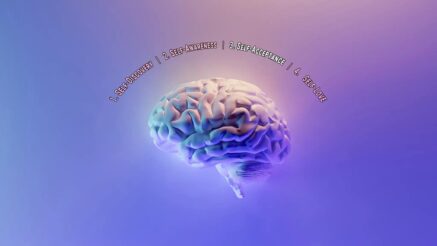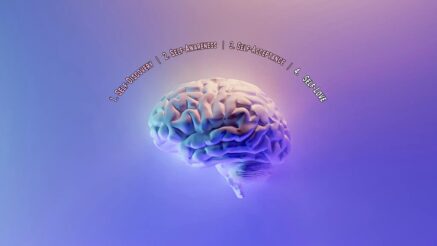Isolation due to the COVID-19 pandemic brought me a much-needed opportunity. I usually struggle in taking care of myself, but in 2020, I decided to put myself first and actively began my journey in learning about myself. It started with self-discovery and continues with self-awareness. What I didn’t know is that this would lead to self-acceptance.
Finding the language that described my struggles, the labels for my disabilities, and then sitting with this information for a long time, is what allowed me to process the information and internalize it.
Learning Takes Practice
I am a literal thinker and pattern finder, as many autistic people are, which means I tend to interpret situations into boolean decisions in order to create “global rules.” These rules, despite falling into the sweeping generalizations fallacy, allows me to apply learned behaviors (that don’t come naturally to me) to a situation in which I’ve identified as matching the criteria for that global rule I made based on a pattern in situations I’ve experienced or witnessed before.
Early on in my self-awareness journey, I learned that society views autism as a disease and that many organizations exist purely to identify the cause of autism and are working to treat and ultimately cure autism.
“The incidence of autism among American children has soared from 1 in 150 in 2000 to 1 in 54 today, and 3.5 million children and adults now live with autism. Yet, few therapies exist to treat this disease – just a few medications and ABA (applied behavioral analysis) programs. This is a fragmented $2.1 billion market comprised of for-profit and non-profit providers that serve autistic patients via brick & mortar centers and in-home therapy provided by therapists. Waiting lists are growing and 64% of patients are estimated to have access to insurance coverage.”—The U.S. Autism Treatment Market (Dec. 2020)
I am autistic and I can tell you that this is most certainly not a disease. Autism is not killing me. It turns out my gut reaction to learning this aligns with the consensus of the autistic community: autism is not a disease and we don’t want a treatment or cure.
How My Autistic Brain Took It Too Far
After learning this, I felt empowered to spread this knowledge. This can become an issue because I’m not great at nuance because autism. There was a post within an autistic-led Facebook group that asked about how we felt about the word “disability.” With my newfound knowledge, I assumed we did not like that descriptor any more than we liked “disease,” ergo: autism is not a disability.
I could not be more wrong.
You see, I was not far along in my self-awareness journey when I felt this incredible empowerment. I did not realize how much autism was woven into my daily life. I still had a lot of internalized ableism that I spewed out:
- autism is just how I think (it is a neurotype, not a disease)
- autism is not bad (I incorrectly equated “disability” with “bad”)
- my deficits were not because of autism because it’s all in my head (I didn’t understand the connection at the time)
I was such an ableist asshole that another autistic person had sarcastically commented to me, “thank god that autism doesn’t disable you” (because I was saying how functional I am “despite” being autistic).
Overcoming Denial by Unpacking Internalized Ableism
That comment was a turning point for me. I spent a few days quietly muttering, “I am disabled?” until I could whisper, “I am disabled.” It took me two weeks to actually say it out loud with some confidence, and probably another month before I even said it to another soul.
I am autistic, and autism is a disability, therefore I am disabled. Disabled is not a bad word, being disabled does not make me less than. It was my internalized ableism that believed it did. It took me a while to accept that because that meant I had to change some global rules and more nuance was being added. Did I mention that I am inherently bad at understanding nuance?
Keep Labeling, But Stop Dissecting
So the heart of this article is to answer the question, “how can I achieve self-acceptance after discovering I’m autistic?”
You might only accept what you know because many of us cannot accept the unknown. Many of us do not thrive in ignorance because ignorance is powerless, not bliss, especially if we believe knowledge is power.
So keep learning about yourself to achieve greater self-awareness but beware the rabbit hole I fell down. I live at the intersection of autism and complex post-traumatic stress disorder (CPTSD). Many symptoms of CPTSD look like autistic traits. Because of this, I was analyzing myself and trying to determine if a specific trait was caused by CPTSD or autism. I would reflect on a behavior or automatic response and ask myself questions like:
- Am I this way because of trauma that happened to me or was I born this way?
- Am I this way because of someone else?
- Is there someone to blame for me being this way?
If you too live at this intersection, then these are some thought distortions you may have had as well. The answers to these questions, despite our nature in wanting to know everything, do not matter. Do yourself a favor and preserve your mental health by not trying to attribute your characteristics to one condition or another. It just leads to spiraling thought distortions like these questions.
Knowing if your hypoempathy is a result of emotional numbing (defensive coping strategy developed in CPTSD) or is simply autism does not change how you handle it today or tomorrow. I may not be natural at emotional empathy, but I can and have learned cognitive and compassionate empathy. I do not need to share in your pain to understand that you’re in pain and to provide you with a safe space to experience it in a way that is unique to you. Pretending like I am experiencing emotional empathy does not help either of us.
It’s taken me a while, but I accept it. I accept me. I am who I am today because of who I was every day leading to now. It’s okay to be both, it’s okay that I am the sum of my parts. It’s okay for you to be too.




